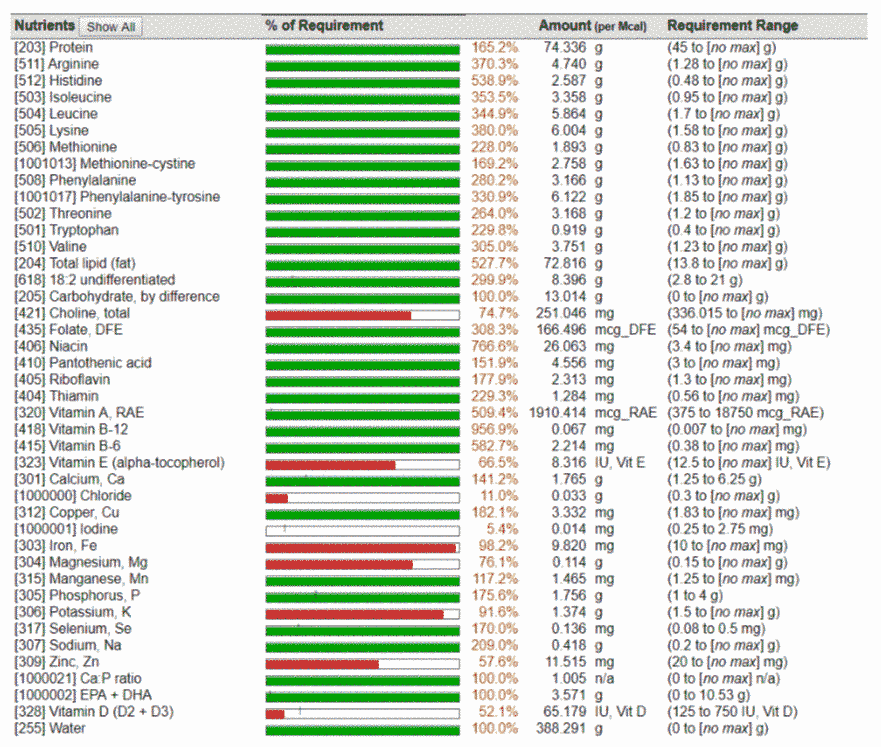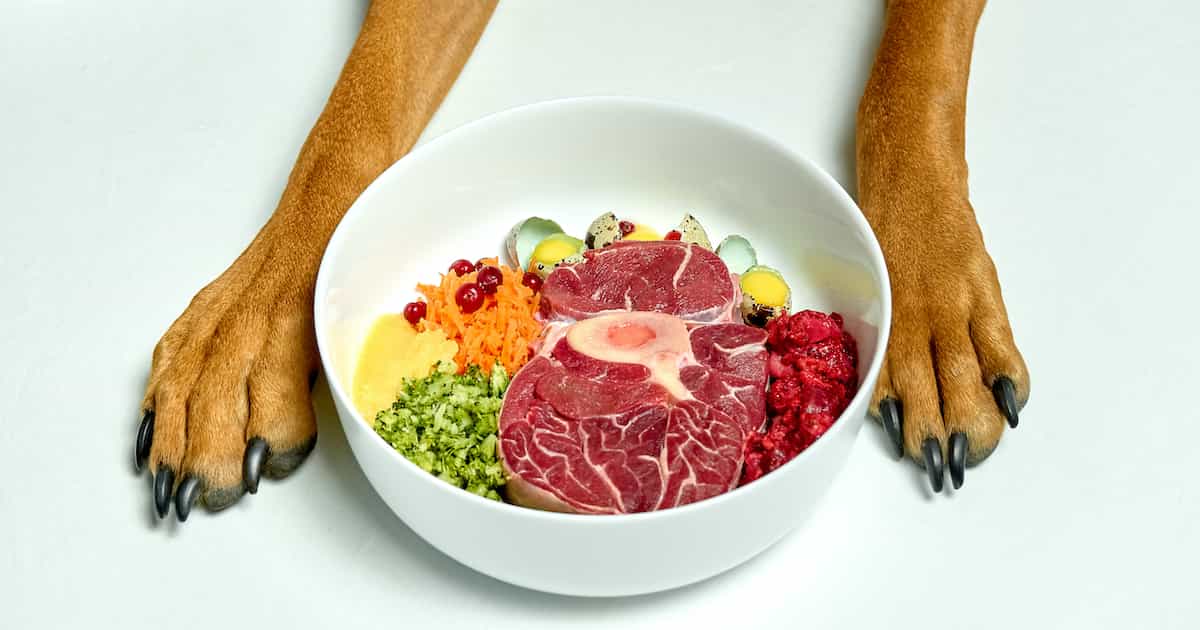Updated September 3, 2021
Why is it that 41% of dogs with cancer are fed a homemade diet?
I support many owners who feed homemade and raw diets, and I try to practise evidence-based healthcare. Therefore, a statistic like this deserves a closer look.
Why Are Dog Cancer Diets So Common?
In the face of a cancer diagnosis, most dog owners very quickly come across strong dietary advice online. Many vets don’t offer any other suggestions so if there’s no harm, it seems logical to try.
Plus, there are sound theoretical reasons why dogs with cancer should be fed differently.
The two most common approaches are described below. Afterwards, I’ll add my views on supplements, and finally come up with a diet recommendation.
Low Carbohydrate Cancer Diets
It’s been known for 100 years that cancer cells preferentially convert glucose into lactic acid even when other fuels are available. This is called the Warburg Effect.
This forms the basis of the most common type of anti-cancer diet. Here, we attempt to starve cancer cells of their food source by depriving the body of carbohydrates.
While good in theory, the problem with these diets is gluconeogenesis. This is where the liver takes proteins and converts them back into glucose in order to maintain blood levels. After all, the brain’s only fuel source is glucose, and without it we go into a coma.
This unavoidable process appears to greatly reduce the efficacy of low carbohydrate diets. So while it’s possible that low carb diets may slow cancer, so far we cannot see any evidence via increased or prolonged survival rates.
Ketogenic Cancer Diets
The ketogenic diet is an ultra-low carbohydrate diet where the majority of the calories come from fats. Often this is by the addition of coconut oil. The aim here is to make cancer cells more vulnerable to other treatments.
There is some low grade evidence of efficacy in humans, but significant concerns exist for dogs. This is because dogs do not tolerate high fat diets well. Pancreatitis, whether obvious or not, is likely to be very common in dogs on ketogenic diets.
For this reason, they cannot be recommended.
Cancer Diet Supplements
There are two diet supplements with some degree of evidence.
The first is fish oil, and especially its omega fatty acids DHA and EPA. Generally speaking, muscle wastage in various diseases can be partly alleviated by the addition of EFAs. Therefore, doses of 40mg/kg EPA and 25mg/kg DHA are often recommended for dogs with cancer.
Once again, care must be taken not to induce pancreatitis.
The second supplement is a polysaccharide extract of Turkeytail mushrooms, also called Trametes versicolor or Coriolus versicolor. In a very small pilot study, the ‘I’m-Yunity’ product delayed the progression of haemangiosarcoma metastases and appeared to extend survival time.
Other supplement benefits are currently unknown. These include cucurmin or turmeric, CBD, yunnan baiyao, Vitamin D, glutamine, green tea, Astragalus, melatonin, and probiotics. S-adenosylmethionine (SAMe) and silybin (milk thistle extract) are two liver support compounds that may be useful in alleviating some of the harmful effects of chemotherapy.
Negative Effects Of Cancer Diets
I also want you to consider ways that dog cancer diets can cause harm. Here are some examples:
- They may change the taste of the food and therefore reduce food intake right when we need it. This is especially true for some supplements such as turmeric.
- Many homemade diets and recipes promoted online are severely unbalanced. Now is not the time to be nutrient deprived. The graphic below shows an analysis we did of a widely advertised cancer diet for dogs.
- Some supplements may actively counteract cancer treatments. A good theoretical example is antioxidants which may reduce oxidative injury to cancer cells in chemotherapy.
- Major diet change in dogs is often associated with gastrointestinal upsets.

What Is The Best Cancer Diet?
In selecting foods for dogs with cancer, we should always follow the principle, “first, do no harm”.
I’m agnostic on clients who choose to use low carbohydrate diets as long as the dog tolerates them and the diet has been properly balanced. This is almost never true for diets available online, but can be done with the help of a veterinary nutritionist.
However, it will disappoint many people to hear that if I had a dog with cancer, I would not change the diet substantially. Food choice is unlikely to alter the course of the disease, but what will is poor nutrition or poor food intake.
I would add omega-3 at the doses mentioned earlier, and I would certainly investigate Turkeytail extract if the cancer I was fighting was prone to metastasis. This is something you could talk over with your vet but great care would be needed to find a reputable source.
How Do We Explain Miracle Cures?
Over my long career I have seen many dogs survive cancer in a way that seemed miraculous. But like everything in life, once you dig deeper, it’s not so simple.
The ‘miracle cures’ that I have seen were all the result of an initial misdiagnosis caused by the first vet not taking a biopsy. Hemangiosarcoma and osteosarcoma in particular are very hard to prove without sending samples away.
Additionally, as I mentioned under mast cell tumours, many cancers behave unpredictably. Some can appear to go into remission, even if untreated. Others don’t grow back even when they aren’t all removed.
A Realistic View?
I’m not going to criticise you for trying a new diet if your dog develops cancer. I just don’t want you to be disappointed. This comes by understanding that all we can hope to do is delay the inevitable.
What about food as a cause of cancer? Here we are on even shakier ground. The main reason that cancer is twice as common in dogs as humans appears to be genes, not diet.
Maintenance of muscle mass is vital in late stage cancer. This is probably the most important effect of the right diet together with moderate exercise. If you can achieve this without sacrificing nutrition or health, your dog’s remaining time should be as high in quality as you can make it.
Whatever diet you choose!
Have something to add? Comments (if open) will appear within 24 hours.
By Andrew Spanner BVSc(Hons) MVetStud, a vet in Adelaide, Australia. Meet his team here.
References
Bianco, A. V., Abood, S., Mutsaers, A., Woods, J. P., Coe, J. B., & Verbrugghe, A. (2020). Unconventional diets and nutritional supplements are more common in dogs with cancer compared to healthy dogs: An online global survey of 345 dog owners. Veterinary and comparative oncology, 18(4), 706-717
Brown, D. C., & Reetz, J. (2012). Single agent polysaccharopeptide delays metastases and improves survival in naturally occurring hemangiosarcoma. Evidence-Based Complementary and Alternative Medicine, 2012
Weber, D. D., Aminzadeh-Gohari, S., Tulipan, J., Catalano, L., Feichtinger, R. G., & Kofler, B. (2020). Ketogenic diet in the treatment of cancer–where do we stand?. Molecular metabolism, 33, 102-121


Hi Andrew
My 10 yr old German Shepard was diagnosed with early cancer most likely hemangiosarcoma 2.5cm in the heart wall. I was told there are 4 types it could be, 1 being benign. I have an appointment with an oncologist in a few weeks. I have read so much about what to feed and not to feed, it’s overwhelming I don’t know what to believe. I currently feed him Hills mobility JD I add some raw meat and veggies 4 eggs a week. Do you have any recommendations.
Regards Vic
Hi Vic. No more than are found in this article. Good luck.
Hi Andrew.
Would you have any listed places in Aus that turkey tail can be purchased from? And do you know how the dosage is worked out? Also, I’ve read some studies in Vit C infusions, i appreciate not main stream vet therapy, have you any opinion on them? My girl has pancreatic cancer, I’m lead to believe chemo won’t do a lot? and i cannot afford stereotactic radiation, so I’m pretty sad and keen to find anything to help her
Hi Jo. No I’m sorry, beyond what is said in this article I don’t know about procuring the extract or the practicalities of using it. However, I’m sure there are people who can advise you. Bear in mind that it wasn’t tested on this type of cancer, which generally has a very poor prognosis regardless of treatment.
Thankyou for your reply Andrew, i appreciate your time.